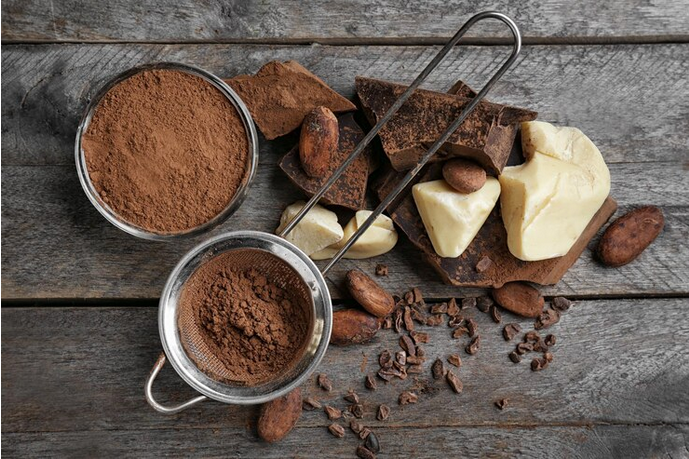Introduction:
In the world of natural skincare and culinary delights, certified organic cocoa butter stands out as a decadent and versatile substance. Derived from the cacao bean, this rich butter is celebrated not only for its luxurious texture but also for its potential health benefits. This article delves into the various facets of certified organic cocoa butter, exploring its origins, characteristics, and the responsible indulgence it offers.
From Bean to Butter: Tracing the Origins of Certified Organic Cocoa Butter:
Certified organic cocoa butter begins its journey in the heart of cacao plantations. The cacao beans, harvested from these lush tropical trees, are processed to extract the cocoa solids and cocoa butter. What distinguishes certified organic cocoa butter is the cultivation process, which adheres to strict organic farming practices. These practices eschew synthetic pesticides and fertilizers, promoting a healthier ecosystem and ensuring that the final product is free from harmful residues.
The Nutrient-Rich Profile: Beyond Indulgence to Nourishment:
One of the key attractions of certified organic cocoa butter lies in its nutrient-rich composition. Packed with antioxidants, vitamins, and healthy fats, it goes beyond being a mere indulgence to offer potential skincare and health benefits. The antioxidants in cocoa butter, such as flavonoids, contribute to its anti-aging properties by combating free radicals that can damage skin cells. The presence of vitamins E and K further enhances its nourishing qualities, promoting skin elasticity and aiding in the reduction of scars and stretch marks.
The healthy fats found in certified organic cocoa butter make it a valuable addition to dietary choices as well. When consumed in moderation, it can contribute to a balanced intake of essential fatty acids, supporting cardiovascular health. This dual functionality of certified organic cocoa butter adds to its allure, making it a favorite among health-conscious consumers.
Skin Deep: The Role of Certified Organic Cocoa Butter in Skincare:
Certified organic cocoa butter's benefits extend to skincare, where it has become a staple in various cosmetic formulations. Its rich texture and moisturizing properties make it an excellent natural emollient, providing deep hydration to the skin. Whether used as a standalone product or as an ingredient in lotions, creams, and balms, cocoa butter helps combat dryness and leaves the skin feeling supple and soft.
Moreover, the presence of polyphenols in cocoa butter contributes to its anti-inflammatory properties, making it suitable for soothing irritated or sensitive skin. The butter's ability to create a protective barrier on the skin's surface helps lock in moisture, making it particularly effective in harsh weather conditions or for individuals with dry skin conditions.
Culinary Delights: The Gourmet Appeal of Certified Organic Cocoa Butter:
Beyond skincare, certified organic cocoa butter adds a gourmet touch to culinary creations. Its distinct chocolate aroma and velvety texture make it an ideal ingredient for desserts, confections, and even savory dishes. Chefs and home cooks alike appreciate its versatility, using it to enhance the flavor and texture of everything from truffles to sauces.
Cocoa butter's high smoke point also makes it suitable for various cooking methods, including sautéing and frying. Its inclusion in recipes not only elevates the culinary experience but also brings with it the potential health benefits associated with its nutrient-rich composition.
Sustainable Practices: The Ethical Edge of Certified Organic Cocoa Butter:
Choosing certified organic cocoa butter aligns with the growing demand for ethically sourced and sustainable products. Organic farming practices prioritize soil health, biodiversity, and the well-being of local communities. By opting for certified organic cocoa butter, consumers contribute to a supply chain that promotes environmental responsibility and social welfare.
Moreover, many certified organic cocoa butter producers actively engage in fair trade practices, ensuring that farmers receive fair compensation for their labor. This ethical dimension adds depth to the consumer's experience, allowing them to indulge in a product that not only enhances their well-being but also supports sustainable and equitable trade practices.
Conclusion:
In conclusion, the richness of certified organic cocoa butter transcends mere indulgence, offering a holistic experience that spans skincare and culinary realms. From its origins on cacao plantations to its nutrient-rich profile, cocoa butter presents a tantalizing combination of luxury and health benefits. Its role in skincare as a moisturizer and anti-inflammatory agent, coupled with its gourmet appeal in culinary creations, makes it a versatile and cherished ingredient.
Choosing certified organic cocoa butter adds an ethical dimension to the indulgence, supporting sustainable and fair trade practices. As consumers increasingly seek products that align with their values, certified organic cocoa butter emerges as a beacon of responsible indulgence. So, whether it's nourishing the skin or delighting the taste buds, certified organic cocoa butter invites individuals to indulge responsibly, savoring the richness it brings to both body and soul.





Comments